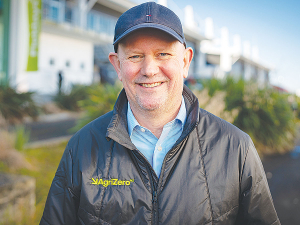AgriZeroNZ invests in methane-reducing tech
A US-based company developing a vaccine to reduce methane emissions in cattle has received another capital injection from New Zealand’s agriculture sector.
 Wayne McNee was initially appointed the JV’s interim executive director to support its establishment after being instrumental in setting up the worldfirst public-private partnership.
Wayne McNee was initially appointed the JV’s interim executive director to support its establishment after being instrumental in setting up the worldfirst public-private partnership.
AgrizeroNZ, the public- private joint venture helping farmers reduce their emissions, has appointed Wayne McNee as its chief executive.
Major agribusiness companies ANZCO, Fonterra, Rabobank, Ravensdown, Silver Fern Farms and Synlait own 50% of AgriZeroNZ, with the other half owned by the Crown through the Ministry for Primary Industries. It was setup to deliver a step-change in investment aimed at accelerating the development and deployment of emissions reduction tools for farmers.
McNee was initially appointed the JV’s interim executive director to support its establishment after being instrumental in setting up the world-first public-private partnership, says Sir Brian Roche KNZM, AgriZeroNZ board chair.
“The board is pleased to appoint Wayne as chief executive to lead the company through its next stage of development, leveraging his deep industry knowledge and relationships across the agricultural sector and the broader market.
“The appointment will provide much needed certainty as we approach the important and challenging task of getting affordable and effective emission reductions tools into farmers’ hands,” said Roche.
McNee says he is excited to take AgriZeroNZ forward beyond its start-up phase and address the critical challenge of reducing emissions from ruminant animals in New Zealand pastoral farming.
“AgriZeroNZ is unique because of the breadth of its sector expertise and commercial focus, along with our collective ambition and advocacy to help farmers reduce their emissions while maintaining profitability.
“We have a great Board and supportive shareholders committed to this long-term partnership, and I look forward to working with them, other funders, the Government, and the companies we are investing in, to get tools into farmers’ hands and deliver on our ambition to reduce agricultural emissions by 30 per cent by 2030.”
McNee says agriculture is the backbone of the New Zealand economy, but global customers of our milk and meat products are setting ambitious greenhouse gas reduction targets which means New Zealand farmers will need to reduce emissions over time.
“AgriZeroNZ is committed to getting farmers the tools they need to meet the targets of our international customers, so they can continue to be the backbone of our economy, help New Zealand achieve its climate goals and lead the way in sustainable pasture-based farming.”
Funding to the JV from agribusiness shareholders is being matched by the Government dollar- for-dollar, to provide around $165 million for the JV’s first four years to 2026.
Since being stood up eight months ago, AgriZeroNZ has made four high-impact investments to bring emissions reduction tools to the market for New Zealand farmers worth over $12 million. Other board members are Jessie Chan, Sir Neville Jordan, Greg Murison, and Fraser Whineray.
Legal controls on the movement of fruits and vegetables are now in place in Auckland’s Mt Roskill suburb, says Biosecurity New Zealand Commissioner North Mike Inglis.
Arable growers worried that some weeds in their crops may have developed herbicide resistance can now get the suspected plants tested for free.
Fruit growers and exporters are worried following the discovery of a male Queensland fruit fly in Auckland this week.
Dairy prices have jumped in the overnight Global Dairy Trade (GDT) auction, breaking a five-month negative streak.
Alliance Group chief executive Willie Wiese is leaving the company after three years in the role.
A booklet produced in 2025 by the Rotoiti 15 trust, Department of Conservation and Scion – now part of the Bioeconomy Science Institute – aims to help people identify insect pests and diseases.
President Donald Trump’s decision to impose tariffs on imports into the US is doing good things for global trade, according…
Seen a giant cheese roll rolling along Southland’s roads?